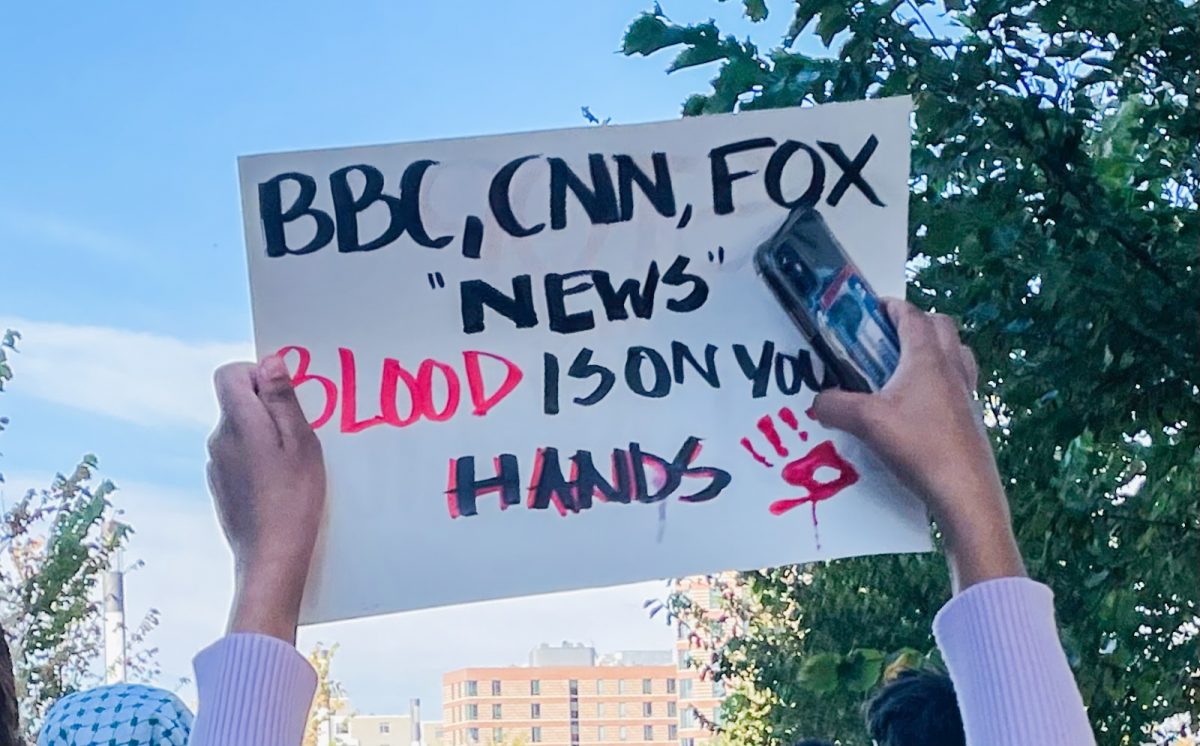On Oct. 25, in the lawn area near the Campus Center bus stop, a group of UMass students began to set up a speaker and mic, while others alongside them held signs of protest and spread the Palestinian flag out for the world to see. The group started small, with only the organizers speaking and listening to one another as they spoke of their outrage toward injustices occurring in Gaza. This slowly drew the attention of passersby students from the hallways and those at the bus stops nearby, who quickly turned into a captive audience.
The speakers were organizers from the Students for Justice in Palestine chapter at UMass Boston, and made their demands loud and clear: UMass Boston must rid itself of any partnerships or products that support the Israeli military, and as an institution, it must make a public acknowledgment of the genocide presently occurring in Gaza. The speakers and signs alike stated that neutrality is siding with the oppressor, pointing out how the United States has a history of remaining silent, and therefore a responsibility to change and critically look at the harm the funding is causing. The discussion led into the other issues that citizens’ tax dollars could address instead, such as better roads, healthcare or humanitarian aid for the damage committed thus far.
This set of speeches was followed by the student organizers announcing that this walkout was to become a march, and went on teaching the—now quite large—crowd of enthusiastic supporters what chants to follow while walking the set route. The chants were constant, loud and determined, their anger for those killed in the ongoing bombings and attacks breaking the previously notable silence that the campus had held in regards to the genocide. The march and walkout were entirely peaceful in nature, and despite being surveilled by police once the walking route was established, the march continued onward, with their goals pushing them beyond any institutional intimidation.
The demands of the Student Justice for Palestine chapter get more specific as well, going so far as to namedrop the brands that UMass Boston supports that also—whether actively or passively—support the Israeli military, such as Raytheon, Northdrop Grumman, Sabra Hummus and General Dynamics. Other chapters of the SJP state that Starbucks, Dunkin’ and Burger King also fall into this category, and should be boycotted by protestors and addressed by any institutions that host them. They also call for UMass Boston to fully renounce any support toward the Israeli military, and to actively bring the conversation about the genocide into the eyes of the community through action and discussion.
For more information regarding organization and protests in support of Gaza or more information on the conflict in general, the National SJP has just launched a newspaper of their own called The Written Resistance, which can be signed up for on their website. If any UMass Boston students are interested in getting involved on a more personal and local level to help spread the word or show support, they can check out UMass Boston’s SJP chapter on Instagram via @UMBSJP.
Between these two sources and some light click-navigation, members of the UMass Boston community can find a multitude of ways to help fund humanitarian aid to send to those affected by the genocide, as well as have their voices heard as the situation worsens. Researching and calling representatives, politicians and showing up for protests of any form help force our country to look at the atrocities occurring, and decide whether or not they want their tax dollars to fund it.

